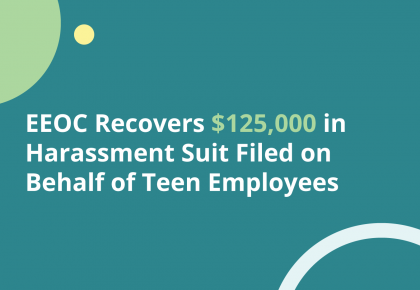#MeToo Defenses Reveal All Too Familiar Themes
- More than three years into the #MeToo movement statements in response to allegations are still filled with excuses and denials rather than apologies.
- Organizations must alter their training approach to include information about respect and culture that will lead to a greater emotional intelligence within the workforce.
- Denials and excuses are permanent, and paint not just the accused, but the organization in a very negative light.
In her March 1, 2020 Texas Law Review article Sorry (Not Sorry): Decoding #MeToo Defenses, associate professor of law and analytics at Georgia State University Charlotte Alexander explored the very timely and interesting topic of defenses to allegations of sexual harassment in the current era. Alexander’s article examined the text of “over two hundred published statements issued by people accused of workplace misconduct as part of the #MeToo movement.” Alexander’s research reveals some disturbing yet unsurprising conclusions about the lack of empathy and/or remorse for accusers, as well as the tendency of those accused of harassment to blame others or circumstances for their actions as opposed to themselves. Importantly, the article revealed the vast majority of statements included denials and excuses, but did not include an apology.
A Brief History of the #MeToo Movementnd Harassment Charges Falls
The #MeToo movement began in 2017 when a wave of celebrities published allegations of misconduct that occurred at work on social media using the hashtag #MeToo. The number of women who came forward grew exponentially, and the years 2018-2020 were filled with new legislation aimed at curbing sexual harassment in the workplace. Alexander’s research is relevant, because it examines the first two years of the movement. While one would hope that the intervening year would have led to progress, we are skeptical given the number of allegations still arising during the pandemic. As such, Alexander’s findings are very relevant in an era where inclusion of thought and equity of treatment is ever at the forefront of the workplace in 2021.
Alexander’s Research Methods
Alexander’s article is revealing in that it uses a manual review of 273 statements by those accused of misconduct. Alexander states she compiled the data using google searches for “official statements labeled as such by the accused or their representative, and reported in the media.” Alexander claims that “using computational methods to analyze text as data” She was able to classify statements into useful analytical groupings. Such an approach is unique to our knowledge in the area of harassment research, and is revealing given the fair likelihood that statements made “off the record” or sentiments held by those accused of harassment are likely far worse than what Alexander’s research revealed by looking at official statements that are arguably intended to absolve or defend the accused of the misconduct. That these statements often lacked emotional intelligence is not only revealing, but also deeply concerning more than three years into the #MeToo era.
Alexander found that 118 of the 273 statements she analyzed contained the term “false,” while 114 contained the term “deny. Also common in the statements were “just joking,” and “mutual flirtation.” Alexander notes that these terms were intended to minimize the impact of the misconduct, while other statements touting the professional credibility of the accused appeared intended to “bolster [one’s own] credibility” rather than take responsibility for any part in the alleged misconduct.
Passing the buck to the accused is a classic deflection technique used by organizations and leaders throughout the workplace spectrum. Therefore, the fact these tactics appear in official statements in response to #MeToo allegations are unfortunately unsurprising. The fact that Alexander’s research revealed only 7% of those accused responded with a “full admission” (as opposed to 38% responding with a full denial) is deeply concerning to both Alexander and this author.
Prevalence of Denials and Excuses Calls for Changes in Training Approach
The training tactics that have been used for years in harassment prevention have long focused on illegal behavior (and how organizations can prevent liability). Part of the reason behind this is the approach taken by state legislatures in states with mandatory training laws. Those states all focus on the legal history and education that misses the emotional intelligence component that leads to the responses discussed in Alexander’s article. Syntrio has taken its training one step beyond the state requirements, and has included a focus on workplace civility, respect, and the importance of a culture of tolerance (and lack of tolerance for inappropriate behavior – illegal or not). Like Alexander’s conclusions, we believe there are far too many excuses and far too little time spent on reducing incidents for the right reasons. In short, when an organization has a positive culture there is likely no need for excuses because there is not a culture tolerant of the behavior that leads to allegations.
Alexander’s article does an excellent job of closely examining the types of defenses used by those accused of sexual harassment and is an extremely worthy read by anyone concerned about (or with a professional interest in) workplace harassment. She poignantly notes “[s]uccess on the individual front, then, might look less like a tally of punishments handed out and more like a measure of individual growth.” By focusing on how allegations have changed the behavior of the accused in the positive, ways where instead of focusing on due process and how to avoid liability, Alexander notes that we may instead “overcome our collective denial and normalization of sex-based and sexual harassment as a feature of the workplace and of society at large.”
When formulating a policy against sexual harassment in the workplace and considering training, Alexander’s research should be a starting point. By examining the responses the accused give, and just how negative a light they can paint your organization in, you will quickly see the need to use training that gives deference to culture and emotional intelligence, in addition to the required elements of legal training implemented by state legislatures. Doing so will hopefully allow your organization to avoid having a published statement on record that is full of denials and excuses that are likely to make an already ugly situation even worse.


